In a New York Times article entitled “The Health System We’d Have if Economists Ran Things,” nearly 200 Ph.D. health economists were surveyed to find out what they thought of the idea. Presented at the American Society of Health Economists conference in the summer of 2019, surprisingly, many of those surveyed reported ” a few politically unpopular decisions.”
The piece deals with diverse topics such as Obamacare (89% rejected repealing the policy), charging a “sin” tax where people are charged more for engaging in unhealthy behaviors like smoking (70% in favor), raising the age of Medicare eligibility (the least opposed policy) and others. Ninety-three percent of health economists felt that “if employers were to spend less on health insurance, wages and other benefits would increase.”
What Is A Healthcare Economist?
Health economics is an applied field of study that uses economic theories to understand the behavior of individuals, healthcare providers, public and private organizations, and governments in decision-making related to health care. To inform the public and private sectors on issues related to healthcare and health policy, health economists use theories of:
- Production
- Efficiency
- Disparities
- Competition
- Regulation
Healthcare economists examine how a medical operation’s resources are allocated, from financial to human resources. Their primary responsibility is to ensure that these resources are utilized most effectively and efficiently to improve patient outcomes while maintaining financial stability.

They conduct research on the impact of health care, health insurance, and preventative services on healthy lifestyles. They also study how different factors influence the utilization of healthcare services, such as cost, access, and quality of care.
These specialists also provide research and advice to governments on how to develop policies and programs that improve health outcomes. This includes analyzing the costs and benefits of healthcare interventions and identifying ways to reduce healthcare disparities and inefficiencies.
Healthcare economists play an essential role in the healthcare industry by utilizing economic principles to inform policy decisions and drive innovation. Their work ultimately aims to improve the quality of care and promote health equity.
How Health Economics Is Shaping Healthcare In The United States
The United States healthcare system is in constant flux, and that’s where healthcare economists come in. As more people are insured and accessing healthcare, healthcare costs have increased.
The Affordable Care Act of 2010 played a significant role in changing the healthcare landscape in the United States. With these changes, healthcare economists began to have a vital role to play in helping policymakers and stakeholders navigate the changes and find solutions to the issues that arise.
We spend more on healthcare per capita than any other country in the world. While this level of spending isn’t necessarily indicative of the quality of care received, it does create an issue when it comes to making healthcare accessible and affordable to everyone. Healthcare economists study the factors contributing to high healthcare costs and recommend controlling them.

Another important area where healthcare economists are involved is determining the value of healthcare services. Healthcare services are expensive, and it is essential to determine whether the cost of treatment is worth the benefit received. Health economists develop models that determine the value of treatments and procedures. These models are used by policymakers to determine which treatments to include in health insurance plans.
The United States has a shortage of healthcare professionals, and this issue has a significant impact on the healthcare system. Healthcare economists analyze the supply and demand of healthcare professionals and make recommendations for improving access to care. For instance, healthcare economists can analyze the impact of immigration policies on the supply of healthcare workers and make recommendations for improving access to healthcare services.
The Demand For Healthcare Economists
The demand for healthcare economists is increasing as the healthcare industry is growing rapidly in the United States. According to the Bureau of Labor Statistics, the job outlook for healthcare economists is projected to grow 14 percent from 2019 to 2029, much faster than the average for all occupations.
The demand for healthcare economists stems from the need for informed decision-making in healthcare policy. The healthcare industry is facing many complex challenges, such as the rising cost of healthcare, the aging population, and the ongoing COVID-19 pandemic.
Healthcare economists are needed to analyze data, evaluate the effectiveness of healthcare policies and programs, and identify strategies to improve healthcare delivery and outcomes.

Healthcare economists are also in demand in the private sector, where they work for healthcare organizations, insurance companies, and consulting firms. In these settings, healthcare economists play a critical role in optimizing resource allocation, pricing strategies, and financial management.
Overall, the demand for healthcare economists is high and expected to grow in the coming years. As the healthcare industry becomes more complex and the need for evidence-based decision-making increases, the role of healthcare economists will become even more important. If you are interested in pursuing a career in healthcare economics, now is a great time to enter the field.
How To Become A Healthcare Economist
To become a healthcare economist, you’ll need to have a background in economics or a related field. Many healthcare economists hold a graduate degree, such as a Master’s in Health Economics or Public Health, and some may even hold a Doctorate in Economics.
Before you apply for a Master’s Degree, experts recommend your bachelor’s degree gives you a “solid academic background in medicine.” There are many undergraduate options in operational- or administrative-based degrees, such as a Bachelor of Science in Nursing, which offers you a broad range of career options in the field of healthcare.

You can also get a bachelor’s degree in economics, which will give you a strong foundation and set you up for a strong Master’s or Ph.D. program degree.
Here are seven of the best Master’s programs in Health Economics available in 2023:
1. Brunel’s Master of Public Health (London, England)
This online course is designed to “help ambitious professionals gain advanced skills and competencies in public health and health promotion.”
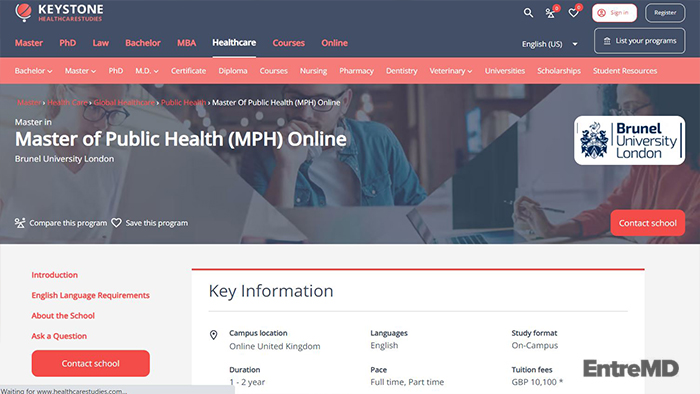
By taking the course, you will acquire a multidisciplinary perspective on public health and health promotion challenges of today and get advanced knowledge in related areas:
- Global public health policy
- Behavior change,
- Epidemiology
- Health economics
- Research skills
2. Master of Public Health (MPH) Health Economics and Policy (Geneva, Switzerland)
The MPH is a Swiss degree awarded by James Lind Institute and is designed to “provide students with a thorough understanding of health economics and policy development and implementation.”
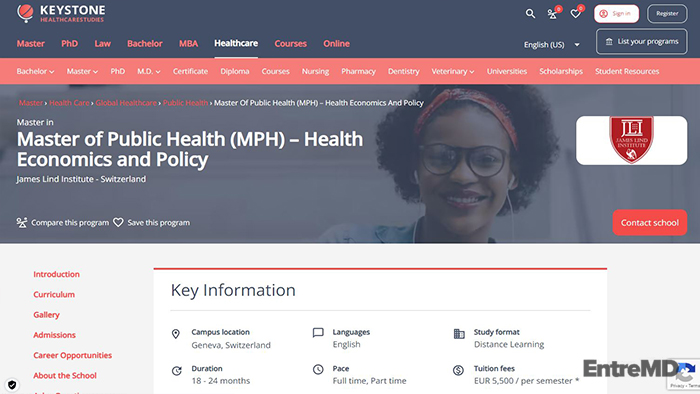
No prior training or education in economics is required to enter this degree program.
“This intense program provides students with exposure to complex economic challenges faced by health organizations globally. Students who complete this course find opportunities in a wide variety of organizations, including health agencies, international health organizations, NGOs, academia, and governmental agencies involved in health delivery and promotion.”
3. MHS in Health Policy and Management — Health Economics & Outcomes Research (Baltimore, USA)
Offered by the Department of Health Policy and Management in the Bloomberg School of Public Health at Johns Hopkins University, this Master’s degree is a nine-month academic program that will give students a foundation in “evaluation methods necessary to promote the efficient and equitable allocation of healthcare resources in public health.”
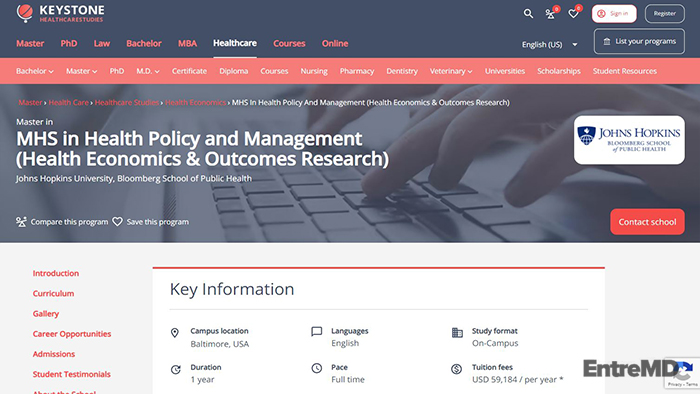
After graduation, students will be “well-positioned” to find a job in academia, government, and industry.
4. Master’s Degree in Health Economics (Rome, Italy)
This Master’s program offers “multidisciplinary preparation in the field of health economics and policy, health law, and business management of public and private firms operating in the health industry.”
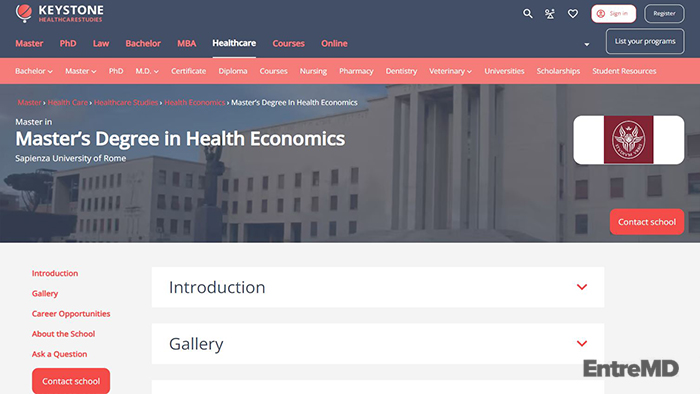
Training economists, consultants, and specialists, graduates will be qualified to hold senior positions in public institutions, private firms and national or international governmental organizations in the healthcare field.
5. MHS in International Health — Global Health Economics (Baltimore, USA)
During the nine-month Master of Health Science (MHS) in Global Health Economics program, students learn how to use economic tools to address pressing global health issues.
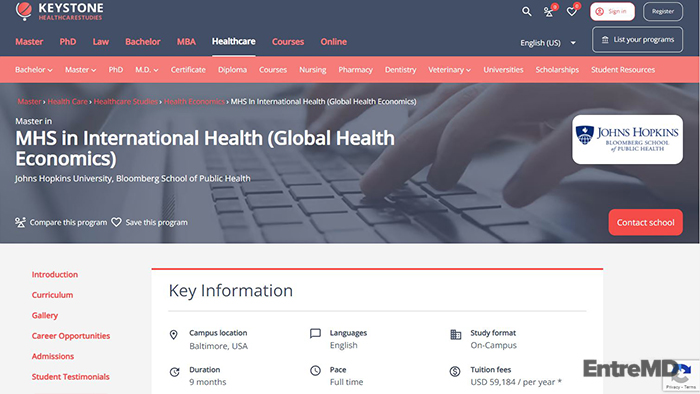
Offered by the Department of International Health, students will “conduct research in health economics and design health policies in relation to a variety of global health issues, such as:
- Vaccines
- Maternal and neonatal care
- Humanitarian conflicts and natural disasters
- Chronic conditions such as diabetes, obesity, and hypertension
- Poverty and access to health care
- Injury and trauma prevention
- Pharmaceuticals and access to drugs
- Globalization trends and their impacts on the global burden of disease and health behavior.”
6. Master in Health Economics (Abu Dhabi, United Arab Emirates)
Health Economics is a multidisciplinary degree that prepares students worldwide for careers in public and private health institutions. A solid understanding of health economics issues surfacing in today’s globalized economy is provided to students using applied quantitative methods to analyze health care data.
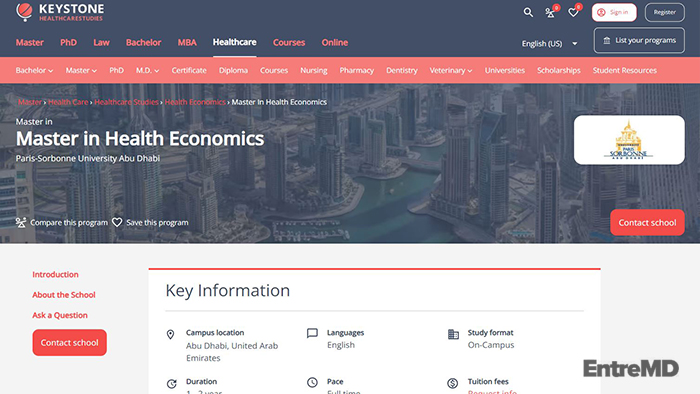
The objective of this program is to “educate the next generation of healthcare professionals to manage, explore, understand and analyze data within healthcare systems, with the ultimate goal of facilitating effective decision-making.” There are two areas of focus with this degree:
- Evaluation of prescription drugs and related policies requires training in cost-effective analysis
- Exploring the consumption of care and care pathways in the health data using econometrics
7. Master of Health Economics (Surabaya, Indonesia)
Taught over the course of three full-time semesters, this Master of Health and Economy Study Program is a multidisciplinary study program. The degree course “provides insight into the economic value of Health, especially for individuals and families and how it impacts the aggregate on public policy in the health sector.”
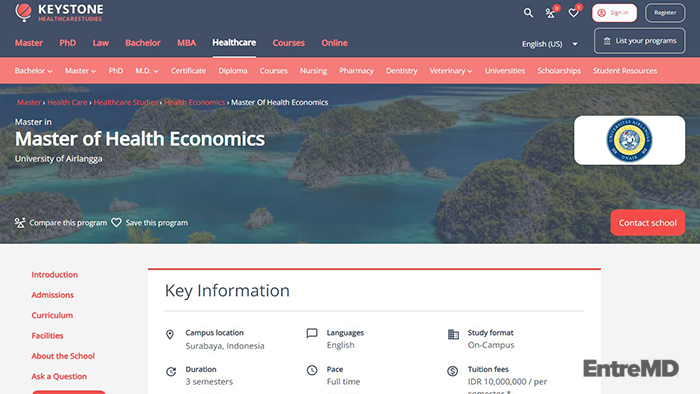
If you’re interested in teaching or conducting research at a college or university, you may need to get a Ph.D. in economics. However, if you’re thinking of getting a Ph.D. at this level, you may want to consider acquiring a more specific economics degree, for example, medical economics, health economics, or health public policy.
In addition to formal education, you will need to have strong analytical skills and an understanding of statistical analysis and modeling, and healthcare economics is shaping the future of healthcare in the United States. You will also need to learn how to communicate your findings to policymakers and other stakeholders in a way that is easily understandable.
Additional skills you may find beneficial include:
- A good grasp of maths, economics, and accounting
- Analytical and logical thinking skills
- Attention to detail
- Excellent verbal communication skills.
Some examples of careers in healthcare economics include the following:
- Health insurance and technology companies
- Pharmaceutical manufacturers
- Non-profit organizations
- Planning new healthcare products or services
- Working in healthcare facilities or hospitals
- Researcher providing data for clinical trials, hospital services, and physician/patient relationships
- Government policy maker
- Solo consultant providing business advice and forecasting
Pros Of Becoming A Healthcare Economist
Here are some of the top reasons to consider becoming a healthcare economist:
1. Competitive salaries: As of May 2023, the average health economist’s salary is $99,895, with a range between $90,325 and $114,003. These salary ranges depend on education, certifications, additional skills, and how many years you’ve spent in the profession.
2. High demand for expertise: With the cost of healthcare continuing to rise in the United States, there is a growing need for experts who can analyze the system and identify ways to make it more efficient. As a healthcare economist, you can help healthcare providers, insurers, and policymakers make better decisions about allocating resources and improving patient outcomes.

3. Varied job opportunities: Healthcare economists can work in a wide range of settings, from government agencies and non-profit organizations to private research firms and consulting firms. This means you can find a job that aligns with your specific interests and expertise.
4. Chance to make a difference: If you want to positively impact society, working as a healthcare economist can be incredibly rewarding. Identifying ways to reduce healthcare costs and improve outcomes can help make healthcare more accessible and equitable for everyone.
The Cons Of Becoming A Healthcare Economist
Here are some of the top reasons to consider not becoming a healthcare economist:
1. Limited job opportunities: Although healthcare economics is in demand, the job market is still competitive, and the number of available positions may be limited in certain geographic areas.
2. Complexity of healthcare system: The United States has a complex healthcare system that can be difficult to navigate. As a healthcare economist, you will need to understand the intricate workings of this system, including insurance and payment structures, healthcare regulations, and government policies.
3. Long hours: Healthcare economists may be required to work long hours to meet deadlines and manage projects. This can include evenings, weekends, and even holidays.

4. Emotional toll: Healthcare economists may analyze and address complex social and ethical issues, including healthcare access and affordability. This can take an emotional toll on individuals, particularly if they feel their work is not having a tangible impact on improving the healthcare system.
5. Advanced education requirements: To become a healthcare economist in the United States, you typically need a graduate degree in healthcare economics, public health, or a related field. This advanced education can be expensive and time-consuming and may not be feasible for everyone.
Does a career as a healthcare economist interest you? No matter what area of healthcare economics you pursue, keep in mind the goal of creating a life on your own terms — where you’re in control of your future and the work you do.
Interested in learning more? Contact me, and I’d love to talk with you!

